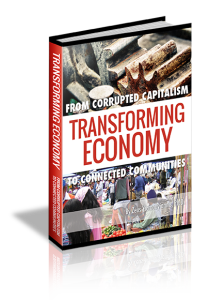It seems like such a simple question, “Who are you?” Yet you’ve almost certainly been taught to answer it wrong. School, family, community, and nation tell you, “You are what you should be.”
You are told that you are your role, your function for others, your bottom line, your possessions. You are taught that you are everything but that massively inconvenient, gnawing “must” that emerges from your deepest intuitions.
Erika Napoletano outed this dirty little contradiction in a July 28, 2012 RiffRaft event in Sacramento. This is backwards she asserted. You are what you “must” be not what you “should” be. You are that ache you cannot escape in your quietest moment. You are that thing you are trying to cover with a manic haze of drama, activity, and procrastination.
With a combination of gratefulness, vulnerability, and strip-it-to-the-bone savvy, the inspiring redhead, went on to include a whole host of personal examples evoking the triumphs and tragedies that befall those willing to commit to their must.
This turned out to be not only an engaging take on personal authenticity, but a valuable catalyst for decision-making as well. Returning to and committing to your must, centers you and clarifies what you may best offer others. When building the foundation of your website, your “must” may be the key issue.
“This could be your first blog post,” offered Tea Silvestre, aka The Word Chef. I had agreed to serve as curricular advisor to Prosperity’s Kitchen, and she was helping me build a rock solid website around my “must.”
I had been scattered, trying to decide which of my diverse interests should guide my website: I have joy and experience around accelerated, creative, non-conventional education. I have an abiding interest in mystic spirituality. I have also developed a sizable web following with guest posts on alternative approaches to the present economy.
What “should” I do? The conventional path would have been to leverage name recognition and exposure from my economics readership into marketing a full-scale book on the topic. But does this drive me long term?
Ultimately, my economics articles are about learning to change something that doesn’t work and creating effective alternatives. One way I do this is by exposing the inner workings of corrupted economics, and presenting better, more promising and fulfilling community-connected directions.
What “must” I do? Tea Silvestre helped me understand that each of my interests are connected with transformative new ways to learn, based upon a different philosophy, including different purposes, different methods, which serve different people and environments. Once I embrace my “must,” I am able to use my uniqueness as a strength to serve other unique learners cast aside by generic social conventions.
Aha. So “new learning” is what drives me. I have my kernel. Now I have to crack it open.
I have agreed to walk through Tea’s “Find Your Secret Sauce” sequence, come up with goals, and develop questions as an adaptive experiment practicing my own creative learning principles. Guided by Tea’s know-how and Secret Sauce course I will be able to articulate and connect my philosophy, purposes, methods, audiences, and webpage design.
It is not always the easiest process, identifying what you “must” be, committing to it, and offering it to the world, but what other choice do you have? You could squelch yourself, be what others expect you to be, and get screwed in the end with a layoff, a pay cut, an unfunded pension, or just plain, good ole death.
There’s never been a better time to be who you are. When society loses its commitments to you, then you have to step up. You must commit to you.
So the lesson is clear: Quit trying to be a good little boy or girl, dammit. Daddy ain’t delivering. Pin down your bliss, commit to its implementation, and get down to business.
Are you waiting for permission, or some expert to set you straight before you embrace your mission? What stories do you have, what fears, what bumps in the road have you experienced in trying to strike off on your own? What people have helped you?

I think we all tend to wait for permission, at first…even if we’re okay with striking out on our own. Especially, if we’ve got others in our life to consider (like a spouse, children, etc.). Just had a nice long talk with my guy this morning about how we could shift things for him. By nature, he’s very risk averse and probably carries too much the ideal of the man-who-must-take-care-of-everyone in his head. He’s not been happy at work for a very long time, and he just had a birthday so it was appropriate to have this permission conversation. Thank goodness, it seems he’s ready to give up on trying to meet an ideal that doesn’t work for him!